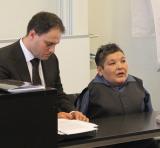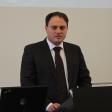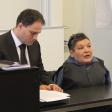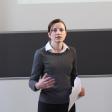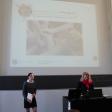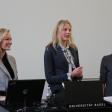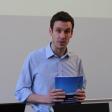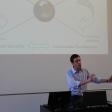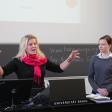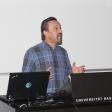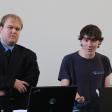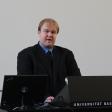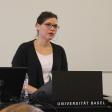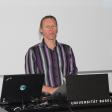On 17 November the Basel Peace Office hosted an international symposium, held at the University of Basel, on the humanitarian consequences of nuclear weapons.
The facts of the issue are indisputable. There are 19,000 nuclear weapons in the world and enough fissile material to make thousands more. One nuke detonated in a city would be 1000 times worse than the Sep 11 terrorist bombing in New York city. 50 nukes used in a regional war would create climate change consequences that would dwarf the current climate crisis, causing global famine and financial and environmental collapse. The catastrophic humanitarian consequences of nuclear weapons render their use incompatible with international law applicable to war – including international humanitarian law and the laws of peace and security (such as the UN Charter).
Despite the existential threat posed by nuclear weapons, the issue receives minimal public attention and political momentum. The Basel Peace Office symposium thus explored ways in which the humanitarian consequences of nuclear weapons and the imperative for nuclear abolition could gain greater publicity and traction on the issue.
Roman Vassilenko, Director of the Nazarbayev Centre and Karipbek Kuyukov, Honorary Ambassador of the ATOM Project, spoke humanizing and personalizing the political debate and inspiring public involvement by highlighting the health and environmental consequences from nuclear weapons tests. The ATOM Project video is an excellent resource to use for public education in this regard.
Jelena Milenkovic, from the Swiss Federal Department of Foreign Affairs, reported on efforts being taken by the Swiss government to build collaboration between like-minded countries to advance the issue of humanitarian consequences of nuclear weapons as a way to break the deadlock in nuclear disarmament negotiations. In October, the Swiss government released a Joint statement on catastrophic humanitarian consequences of nuclear weapons which was co-sponsored by 33 other countries. This initiative has been helped by the work of the International Committee of Red Cross to highlight the inhumanity and illegality of nuclear weapons (see ICRC and nuclear weapons and also the Basel Peace Office opening reception).
Rob van Riet, from the World Future Council, spoke on the connections between climate change and nuclear weapons. These connections could help to build media attention and public engagement to nuclear weapons, arising from the considerable media and public attention already on climate change. (See Climate-Nuclear Nexus).
Jean-Marie Collin, PNND Coordinator for France, reported on a recent breakthrough in France which is opening up public debate on nuclear weapons issues. In France, nuclear weapons are generally equated with pride - making France a responsible global power, as well as being a positive legacy from General Charles De Gaulle and a necessary deterrence to prevent a repeat of the 1st and 2nd World War occupations of France. However, a recent book by former French Defence Minister Paul Quiles (“Nucléaire, un mensonge français: Réflexions sur le désarmement nucléaire”), is changing the debate in France from one of mythical support to rational discussion on the utility of nuclear weapons in a changing world. Jean-marie reported that PNND is working closely with Quiles including writing a chapter for his book, translating it into English and organising a parliamentary conference in the French Senate in January 2013 that will feature Quiles and other notable French figures (See Mensonge Français! French Defense Minister re-evaluates nuclear deterrence!).
Martin Hinrichs and Christian Ciobanu, Ban All Nukes Generation, spoke about ways to engage youth in nuclear abolition initiatives by providing opportunities for youth to engage with decision-makers at key nuclear disarmament events such as the Non-Proliferation Treaty Review Conferences and the conference on humanitarian consequences of nuclear weapons to be hosted by the Norwegian government in March 2013. (See also Claim your voice: Ban the Bomb).
Svenja Quitsch and Carola Szemerey from the Youth Future Project spoke about ways to empower youth to be agents for change not just bystanders or inheritors of the status quo. The Youth Future Project helps youth to develop their dreams and visions for a better world into practical projects and campaigns.
Sara Hirsch, Elin Ledskog and Courtney Hejl, from Universal Models for Peace, demonstrated some of their techniques for reaching a wider section of the public. These include random street interviews, You-Tube videos, social media posts, using models and other celebrities to showcase nuclear disarmament stories and heroes, and using the entertainment networks. Universal Models for Peace was established by models and others in the fashion industry to enhance public awareness of global problems and their solutions – particularly relating to the UN Millennium Development Goals. They are currently working with PNND and the ATOM Project on media projects to advance nuclear abolition.
Alyn Ware - Global Coordinator of PNND, co-founder of the Abolition 2000 Global Network for Eliminating Nuclear Weapons, and 2009 Laureate of the Right Livelihood Award (‘Alternative Nobel Peace Prize’), highlighted some of the recent developments making the abolition of nuclear weapons more possible ‘in our lifetimes’. These include US President Obama’s vision for a nuclear-weapons-free world, the emergence of cross-party support for a nuclear-weapons-free world from other high-level states-people around the world, the UN Secretary-General’s Five-Point Plan for achieving such a world, and the increase in civil society action for nuclear abolition. However, continued adherence to nuclear deterrence and vested interests from corporations making nuclear weapons (it’s a $100 billion per annum industry) and from governments seeking power from nuclear weapons, need to be addressed. The Basel Peace Office can make valuable contributions in these areas through its core programs.
Following the symposium, there was a youth meeting to develop collaboration between the Basel Peace Centre and the key youth networks on peace and disarmament, including plans for a youth workshop on Sports and Peace in Basel in 2013.
